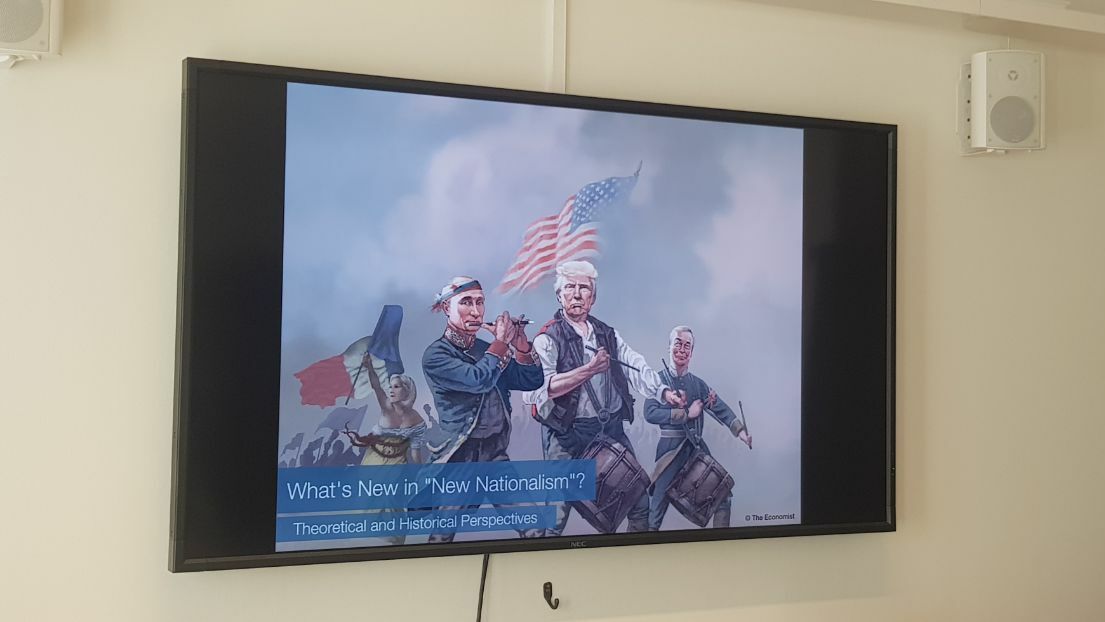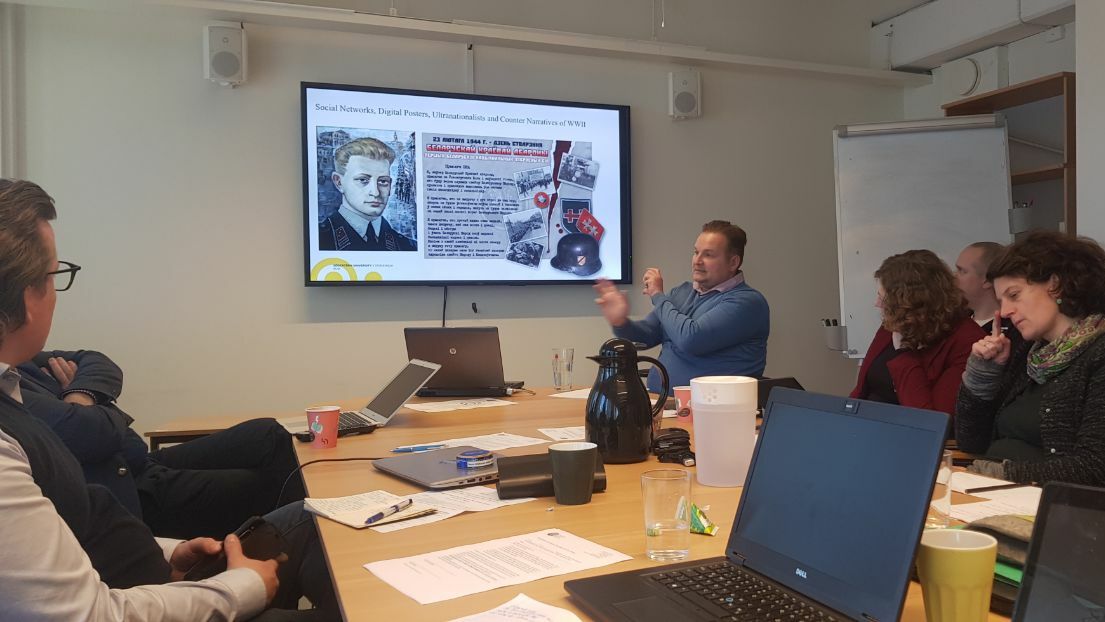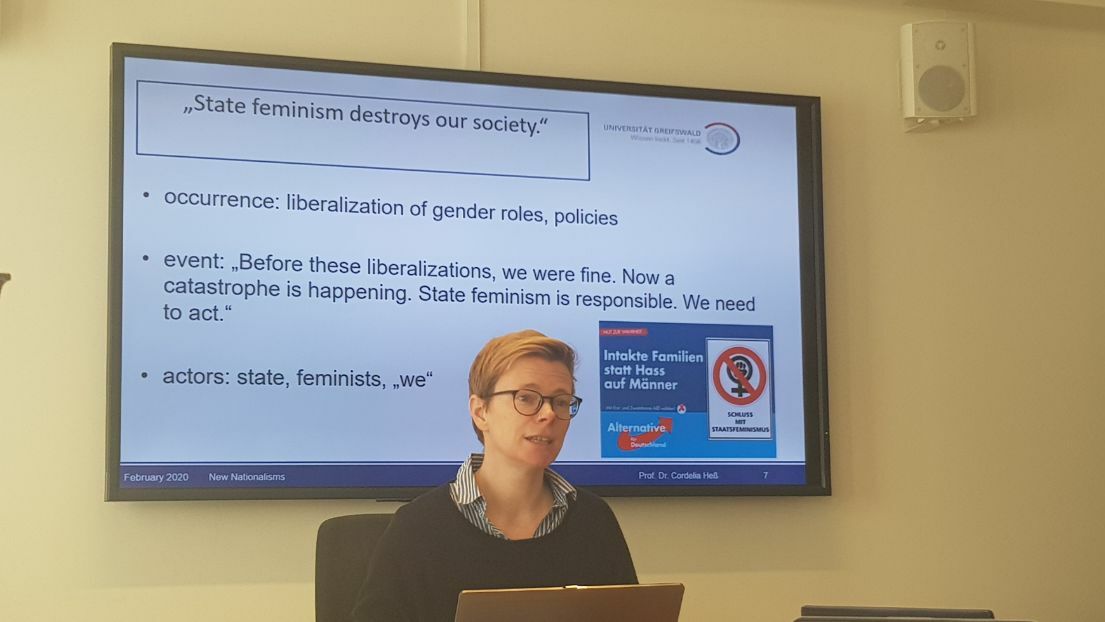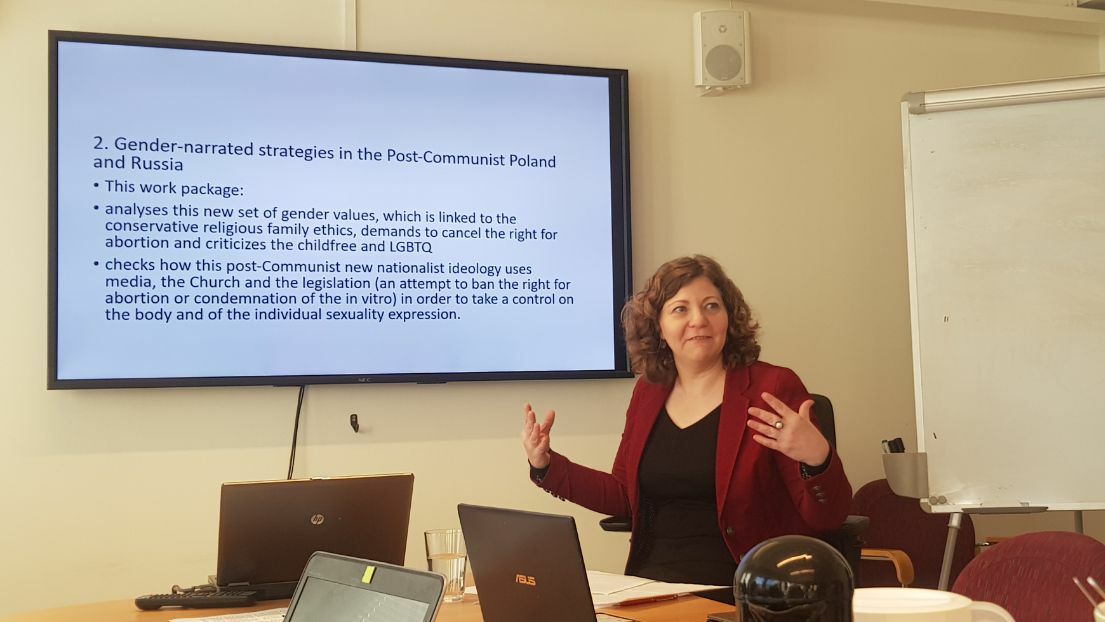New Nationalisms in the Baltic Sea Regions. Master Narratives and Counter Narratives in New Nationalism.
Workshop Report – New Nationalisms in the Baltic Sea Regions. Master Narratives and Counter Narratives in New Nationalism.
25.02.2020
On February 3-4 2020, The Interdisciplinary Research Centre for Baltic Sea Region (IFZO) Cluster “New Nationalisms” together with the University of Stockholm. organized a second international and interdisciplinary workshop “New Nationalisms in the Baltic Sea Regions. Master Narratives and Counter Narratives in New Nationalisms” in Stockholm. The workshop focused on the transnational and comparative research of the of political, cultural and social strategies of the nowadays’ new nationalisms in the Baltic Sea Region (Sweden, Germany, Latvia, Estonia and Russia) and on the mechanisms through which they constantly achieve increasing power and growth within European societies.
At the workshop opening Cordelia Heß (University of Greifswald), the speaker of the cluster, introduced the participants the whole concept of IFZO and the research program of the cluster “New Nationalisms” which analyses the new nationalist strategy of tracing the development of political ideologies by political and social actors through the process of creation of narratives and of their further implementation through various tools, such as media, language, legislation or construction of history. Anna Novikov (University of Greifswald), the postdoctoral fellow at IFZO and at the cluster, presented the work packages dedicated to the history construction and to the gender and GLBTQ topics. Yvonne Bindrim (University of Greifswald), presented the cluster’ linguistic work package which was followed by discussion moderated by Aryo Makko (Network for the History of International Relations (IRH), Stockholm University).
At the second session Youth, Memory Politics and Public Discourse in the Baltic Sea Region Tomislav Dulić (Uppsala University) discussed the theoretical and historical perspectives of the New Nationalisms, starting from the term which was first introduced by Roosevelt in 1910. Then he related to the major features of the nowadays’ new nationalisms and their political actors while he analysed the historical and political roots of three types of new nationalisms: the liberal, the conservative and the fascist ones, their strategies, their rhetoric and their overlapping points. Finally, he related to the theoretical significance which makes it new questioning it and to the elements of novelty.
Peteris Timofejevs (Umea University) discussed the transnational elements within the populist radical right youth organizations in the Baltic Sea Area. There, he focused on the emergence of transnational elite of youth, on the methodology of his research and on the data which can be used in such type of research of the radical right and which in a large measure is based on various social media. He mentioned the effects of such transnational interaction, such as spreading ideas, demonstration effects or reputational calculus.
Charlotta Seiler Brylla (University of Stockholm) represented the research of new nationalisms and of the far right through the Swedish term of the “Opinion Corridor”, negotiating the "sayable" in Swedish public discourse. There, she represented this neologism - the buffer zone where you can still voice your opinion and the research question: what meanings and value judgements are attached to the word “opinion corridor” (Askitskorridor in Swedish), doing a word-oriented analysis as a way of understanding discourse.
Following her, catchwords as an expression a specific relevance at a specific time and is used to propagate a policy or an objective in public and often are a form of nomination and as such, the Opinion Corridor has a strong influence on a discourse.
Andrej Kotljarchuk and Steffen Werther (Södertörn University) represented their research project on the memory politics in Far Right Europe through the celebrations of Nazi collaborationists in Post-1989 Belarus, Romania, Flanders and Denmark. Their project analyses the memory politics done by the Far Right through the victory memorials, new national dates, memoirs of the war veterans and symbols. While Andrej Kotljarchuk focuses on the former Post-Communist states, Steffen Werther conducts his research on the Western part, including Denmark, Sweden, Norway, Germany, Netherlands and Flanders. Their sources, in addition to the visual ones are publications, periodicals, newsletters and websites.
Ann-Judith Rabenschlag Karpe (Stockholm University) moderated the discussion which followed the session.
At the third session, The Far Right and the Immigrant Discourse in Eastern and Western Germany: before and after 1989, Ann-Judith Rabenschlag Karpe (Stockholm University) discussed the perception of immigrants in Eastern Germany before and after 1989 with some reflections on possible historical continuities in the recent decade. She analysed the test case of the foreign workers in the former GDR, which was a new system with new ideological settings. In the official discourse, the immigrants were represented as “our friends from abroad”, who received their “second home” and the GDR narrative spoke about the intercultural togetherness in a country against fascism using such keywords as “international solidarity”, “proletarian internationalism” and the “people’s friendship”. She demonstrated the official political narrative versus the daily life of GDR inhabitants and their relations with the foreign workers. Finally, she showed how the analysis of historical sources helps to understand the contemporary phenomenon of new nationalism and the perception of migration and xenophobic discourse in the nowadays Eastern Germany.
Fabian Virchow(University of Applied Sciences Düsseldorf) spoke about the far right discourse communities in contemporary Germany. There, he represented the strategic options (political opposition inside the system, creation of narratives, different discourse communities) and ideological narratives of various far right parties and communities. He also related to their approach to history and the future and variations in their ideology (Völkisch, National Socialist, Conservative, National-Revolutionary, etc.).
The session was followed by discussion moderated by Anna Novikov (University of Greifswald).
The first workshop day was summarized by a round table discussion and conclusion with Cordelia Heß (University of Greifswald) as a moderator and a discussant. The discussion encompassed such topics as “What is a narrative and The Narrative?”, “Sources and Data on new nationalisms”, “who are the new nationalist actors”.
The second workshop day was dedicated to a broader and deeper discussions of the structure and content of the cluster “New Nationalisms” and on its six work packages. The workshop was finalized by a discussion on the possibilities of future collaboration and networking.
Text: Anna Novikov




